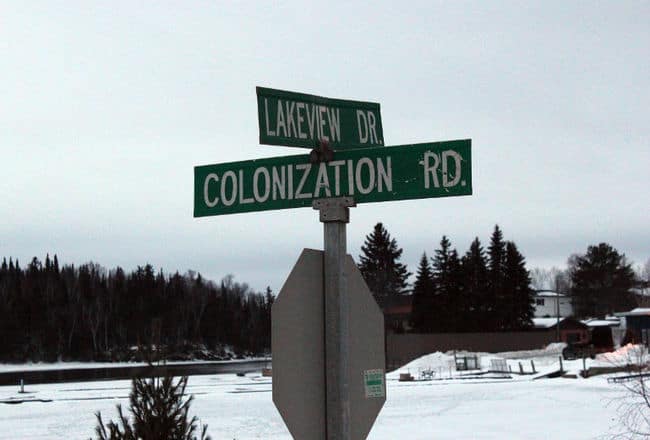
Supporting Great Documentaries for Greater Impact
Guest post by Chris Lee, Manager of Grants and Media Impact Funding
When I watch documentaries like Michelle St. John’s Colonization Road at the imagineNative Festival I am transported back to high school and the Canadian history classes I sat in. I am reminded of the vast gaps in what were presented as the formative stories of this country: “Natives” as helpers of the 1812 rebellion, but not their resistance against colonization; Indigenous peoples as victims of European smallpox, but no mention of how residential schools were a central piece of cultural genocide, with some not closing until as recently as the 1990s. The list goes on.

A still from Michelle St. John’s documentary Colonization Road which Inspirit supported with a Doc Impact Fund in 2017.
My education about colonization in Canada and the centuries-long resistance by Indigenous communities did not begin until well after I completed my undergraduate studies. I know now this is not because important stories told by Indigenous filmmakers—as well as authors and scholars—didn’t exist at the time. We had the groundbreaking films of people like Alana Obomsawin and Loretta Todd in the ’80s and ’90s. And yet documentaries like Colonization Road and Waniska remind me there continues to be a vital need for new narratives that challenge the status quo, shed light on pressing issues of our time, and enrich our understanding of history in ways that support Indigenous communities seeking justice. Given the risk of “reconciliation” becoming a buzzword that is disconnected from meaningful change, it is deeply important that stories by Indigenous mediamakers are elevated.
We also know that stories need audiences. This is the impetus behind Doc Impact Fund: to increase the odds that these documentaries are seen and heard by the right audiences, thus increasing their potential to spark change.

A still from the documentary The Long Way Home which was also supported with an Inspirit Doc Impact Fund grant in 2017. The film touches on the intersections of Islamophobia and immigration when the Canadian government denied re-entry for Sudanese-born Canadian Abousfian Abdelrazik based on false allegations of terrorism.
I think about what I might have walked away with if I had seen Colonization Road in grade 11. I wonder, “What if every high school student in Ontario sees this today?” Would there be more stories like that from Blind River, Ontario, where the street formerly known as Colonization Road is now named after local Anishnaabe artist Cecil Youngfox, thanks to efforts by young Indigenous change leaders?
As part of their campaign supported by Inspirit, Michelle St. John and comedian Ryan McMahon, who’s featured in the film, will be engaging students and teachers with new educational materials to support the outreach of the film and deepen its impact. Colonization Road is a great vehicle for this audience. It makes history come alive and grounds it in today’s context, all with a healthy dose of Anishnaabe humour courtesy of Ryan’s biting wit.
Michelle and Ryan also also committed to sharing these stories with their communities. This summer, they are hitting the Powwow trail and re-visiting communities that are in the film including Fort Frances, which unfortunately has resisted calls to rename its Colonization Road.
This is one example of the work Inspirit is proud to be funding as we delve deeper into supporting documentaries for change.
In 2018-19, our Doc Impact Fund will be supporting another 4 projects that aim to raise awareness about pressing issues related to ethnic, racial, or religious discrimination in Canada; build understanding of underrepresented perspectives; and catalyze action to build inclusion. Applications are now closed but you can learn more about this fund here and read about Doc Impact Fund recipients here.